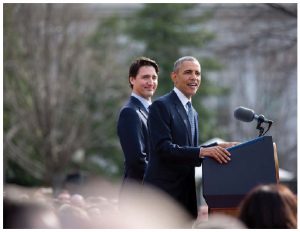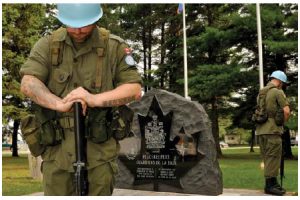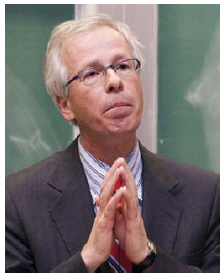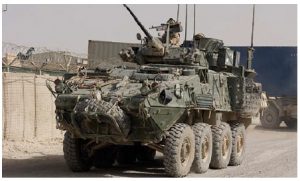
In a major speech at the University of Ottawa in March, Foreign Minister Stéphane Dion described the guiding principle of Liberal foreign policy as “responsible conviction.” The two-word term is a good starting point for analyzing the Liberal approach to Canada’s place in the world.
Although Dion put a different spin on the expression, it’s reasonable to assume that “responsible” means protecting our national interests and “conviction” means projecting Canadian values, including democracy, rule of law, human rights, respect for minorities and some new ones discussed below.
In an ideal world, interests and values coincide. But as the government is discovering, this is not always the case. Former U.S. House speaker Tip O’Neill used to say “all politics is local.” In today’s Canada, foreign policy has also become local. In a diverse country, with a great patchwork of ethnic communities and pressure groups, manoeuvring on the world stage means constantly looking over your shoulder. So any Canadian government’s international interests and even its values are shaped by domestic politics.
A new, yet old, direction
After seven months of Liberal government, the glow of sunny ways lingers with at least some members of the international arena. Canada’s newfound support for popular causes, such as fighting climate change and the government’s promise of renewed “multilateralism,” have been widely welcomed. Prime Minister Justin Trudeau’s debut as a fresh and engaging personality has strengthened the impression of a changed Canada. A “compassionate and constructive voice” has replaced the grumpiness and black-and-white views of Stephen Harper’s government. In short, Canada is back.
But back to what? The government’s first budget reaffirmed Liberal intentions on everything from fiscal policy to defence and foreign affairs. The chapter titled “Canada and the World” signalled a return to the glories of the Pearson era. No matter that the world has profoundly changed or that this period may not have been as glorious as remembered and that Canada was not as key a player as the true believers imagine. For example, the 13 Canadians who supported Maj. Gen. Roméo Dallaire in Rwanda in 1994 had no chance of influencing events in that country. A more robust Canadian contingent might have mitigated the worst of the massacres. In 2004, former Alberta MP David Kilgour, a strong supporter of Canadian peacekeeping, said the military, even for this purpose, had suffered chronic underfunding for 20 years.
Defence as a bellwether

A government’s attitude to defence is a bellwether of its broader view of Canada’s role in the world. For those who believe in a robust contribution to western security, the prospects aren’t good. The speech from the throne promised a “leaner, more agile” military, invariably code words for smaller.
The budget confirmed this. While it lavished spending on worthy programs, defence was the big loser. A total of $3.7 billion in equipment spending was deferred for at least five years on the premise, partially correct, that the Department of National Defence is incapable of spending it.
The finance minister promised that the money will be available sometime in the future to “align with the timing of major equipment acquisitions.” But as former chief of defence staff Rick Hillier has pointed out, “if it’s not in the fiscal framework, it’s not there.” And even if it is, defence inflation (traditionally far above the general rate) chews up much of its value.

A decision at the 2014 NATO Summit stated that members would aim to dedicate at least two percent of GDP to defence. In a world of exploding terrorism and ominously increasing military power of potential adversaries such as Russia, China, Iran and North Korea, two percent is a modest goal.
Despite its hard talk, the previous Conservative government never had any intention of achieving that goal. In fact, Canada’s defence spending has hovered at or below one percent for many years, one of the lowest in NATO and a lot lower than any of our major allies. The Liberal budget confirms that defence will continue to be underfunded. After our brief shining moment in Afghanistan, Canada is once again viewed as a defence freeloader.
In the March budget, $5 billion was set aside for a return to Canada’s traditional role in the world. The money will go toward fighting climate change, international re-engagement (including a relatively small amount for the Iraq training mission), refugee settlement and humanitarian crises — all very much in keeping with Canada’s new international image.
In April, Defence Minister Harjit Sajjan announced a defence policy review to be completed by the end of 2016. The government claims it seeks wide public consultation, but it appears the basic framework may already have been decided. Doug Bland, of Queen’s University, has suggested that “Prime Minister Trudeau… needs a credible rationale to support his defence budget cuts and time to construct an ‘in the national interest’ rationale for them.” More worrying is that the review will be conducted without a foreign policy strategy, logically the first step in the process.

At this stage, it seems clear Canada’s future armed forces, and their roles, will be shaped by strict limits on spending and a clear preference for UN-style peacekeeping over combat operations. This comes at a time when Canada’s major allies are scrambling to rebuild their combat forces and the U.S. has announced the redeployment of combat units to Europe, including non-NATO Finland and Sweden.
Canada has now been asked to contribute to a 4,000-strong NATO force that will be rotated between Poland and the Baltic States. Should we support our allies against possible Russian aggression, perhaps at the expense of UN peacekeeping? The government is hesitating, but, it’s hard to believe that it will not agree to some form of contribution, although it will almost certainly be smaller than what NATO initially asked for.
Selective multilateralism?
Multilateralism is one of the new values of Canadian foreign policy. The UN will certainly be a key element of our new approach. Diplomatic horse-trading and considerable amounts of money will ensure that Canada regains its rightful seat on the Security Council in 2021. The Liberal government seems to think a place on the council will give Canada a major voice in world affairs. Security Council membership does carry a certain prestige, mostly among diplomats, but the truth is that temporary members don’t ultimately influence the war and peace decisions of the permanent members.
In the spirit of new multilateralism, Canada enthusiastically supported, and apparently helped to draft, the December 2015 Paris Agreement on the fight against climate change. The government contends that money spent on green technology and reducing greenhouse gases will create middle-class jobs, a nice conjunction of values and interests. But long-term commitments to the Paris goals are fragile. If they adversely affect our standard of living, a future government could ignore or jettison them in favour of its political interests.
The Liberals’ withdrawal of Canadian CF-18 fighter jets from Iraq and Syria shows the limits of the new multilateralism. The as-yet-unexplained decision has reinforced a sense amongst our allies that Canada will be a less reliable military partner. This is certainly not in Canada’s long-term national interest.
Then there’s the sale of $15 billion worth of armoured vehicles to Saudi Arabia, a country with an awful human rights record. It’s an unwelcome foreign policy dilemma for the government and the clearest possible clash of economic, political and strategic interests with core Canadian values. Yet, despite wide criticism, the government says it won’t block the deal. In this case, maintaining Canadian jobs (an important political interest), as well as wider strategic interests, apparently outweigh concerns about acting in accordance with Canadian values — and perhaps even Canadian law.
In a similar vein, boosting economic ties with China is based on the view that it’s in Canada’s interest to work more closely with a country that systematically violates the basic human rights of its citizens and minority groups and whose foreign minister publicly chastised our own press freedom. But this policy of cosying up to China could have a short shelf life. Aggressive Chinese territorial ambitions and a general disdain for international law seriously threaten some of our friends in the region and could eventually lead to conflict with the United States. What then for Canadian trade and investment in China, or Chinese investment here?
Stéphane Dion claims resuming dialogue with Russia and Iran is a sensible return to Canada’s traditional pragmatic approach to foreign policy, part of the wholesale reversal of Conservative policies. Churchill famously said “jaw-jaw” is better than “war-war.” But if your partners are already engaging in war-war (Crimea, Syria, Iraq, Iranian support of terrorist groups and vows to wipe out Israel), jaw-jaw may not be enough. If aggression by Russia or Iran calls for more forceful action, what can Canada contribute?
Trudeau’s first visit to Washington was hailed as a great move forward in Canada-U.S. relations. Aside from personal chemistry, Trudeau and Barack Obama share a great deal of ideological common ground.
Certainly friendly relations at the top set a positive tone in other areas. But what real effect this will have on the tough bilateral issues of cross-border trade, border security, missile defence and Canada’s diminishing contribution to allied defence and security remains to be seen. Obama’s successor may not be as susceptible to the Trudeau charm, and a new bilateral framework based on something more substantive will have to be built.
The dangers ahead
More than seven months into the Liberal government’s term, Canadian foreign policy has undergone an important change of substance, not just tone. While the traditional pillars of Canada’s international engagement are still discernable, our priorities are undergoing a profound shift.
The government believes generosity and a sunny outlook will strengthen Canada’s role in the world and make us safer. But sooner rather than later, the ominous clouds on the horizon, which others, including CSIS in its recent report on Russia’s growing military strength and intentions, have already noticed, may force us to face the growing dangers to our way of life and ultimately to the security of Canada — our supreme national interest.
If and when that happens, we may find that we have not had foreign and defence policies that have adequately prepared us to stand alongside our allies to defend our own values and our country.
Richard Cohen is a former Canadian and British army officer, a professor of European security at the George Marshall Center in Germany and a senior adviser to former defence minister Peter MacKay.





